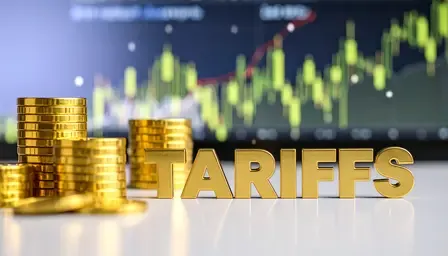Are Trump Tariffs a 'Slow Burn' for Wall Street?

Synopsis
Key Takeaways
- Tariffs are a form of taxation that can burden consumers.
- Caterpillar Inc. estimates significant losses due to tariffs.
- The stock market may not reflect the struggles of the average consumer.
- Warren Buffett is positioning for potential market declines.
- Legal challenges could create further instability.
New Delhi, Aug 10 (NationPress) The reciprocal tariffs introduced by US President Donald Trump represent a "slow burn" for Wall Street; they rarely ignite an immediate crisis. However, over time, they distort markets, burden consumers, and provoke retaliatory measures, according to a recent analysis.
Investors and policymakers should keep in mind that just because the storm isn’t here yet, it doesn’t mean it isn’t approaching, asserts Zoya Najeeb in an opinion piece featured in One World Outlook.
"While Wall Street celebrates record-high stock indexes, the US economy is quietly swallowing a bitter pill: tariffs. The same markets that panicked in April are now dismissing the reality of a new trade regime—one that could be far more expensive than investors are prepared to acknowledge," the article emphasized.
White House press secretary Karoline Leavitt recently hailed the collection of $29 billion in tariff revenue in July, with Commerce Secretary Howard Lutnick forecasting $50 billion per month in the near future.
"However, tariffs are just another form of taxes, and this is a tax increase on Americans at a time when the lower half of the income spectrum is already struggling," the write-up stated.
Caterpillar Inc., a leading American manufacturer in construction and mining equipment, estimates that the new tariffs will cost it up to $1.5 billion this year—$500 million just in the current quarter.
"Yet its stock barely reacted, buoyed by investor confidence in unrelated surges in AI data centers and infrastructure spending. This situation serves as a perfect metaphor for today's K-shaped economy: Wall Street thrives while Main Street grapples with rising grocery bills and more households resort to 'buy now, pay later' schemes just to survive," the report pointed out.
The AI boom may be bolstering the stock indexes, but if you exclude tech, the S&P 500 remains stagnant.
"Even Warren Buffett—not exactly a doomsayer—has been quietly offloading stocks for 11 consecutive quarters, building a $344 billion war chest to invest when prices decline. He seems to be betting on a downturn, even as the broader market does not," the report noted.
In the meantime, former US House Speaker Paul Ryan has cautioned that "choppy waters are ahead" due to potential legal challenges surrounding the tariffs.










